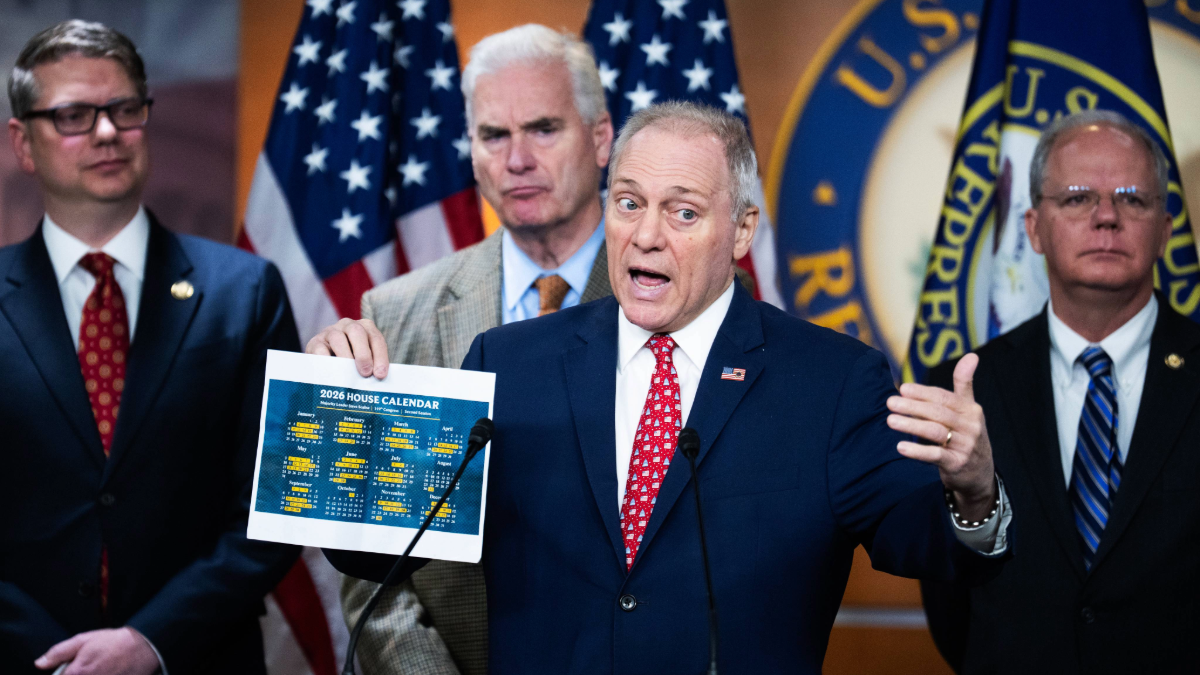It’s Back. Congress Gears Up for Year-End Fight Over Moratorium on AI Laws.
Cristiano Lima-Strong / Nov 18, 2025
House Majority Leader Steve Scalise (R-LA) speaks about the 2026 Congressional calendar during a news conference with House Republican leadership in the Capitol Visitor Center on Tuesday, November 18, 2025. Tom Williams/CQ-Roll Call, Inc via Getty Images)
United States lawmakers are preparing for another potential showdown over a proposed moratorium on state artificial intelligence rules, with House lawmakers considering using an annual defense measure as a vehicle to get it passed after an earlier attempt unraveled.
House Majority Leader Steve Scalise (R-LA) told Punchbowl News on Monday that the chamber is “looking at” tucking the language into the National Defense Authorization Act (NDAA), a yearly defense spending bill widely viewed as must-pass and often used to attach other policy measures. The remarks signal the battle is poised to reenter the public spotlight by year’s end.
According to Politico, House and Senate leaders are aiming to finalize a deal on the defense package before lawmakers break for the Thanksgiving holiday on Nov. 27, with final votes on track for early December.
It’s unclear what form the AI moratorium may take. Initially proposed earlier this year as a sweeping prohibition on states enforcing AI laws for 10 years, it was later shortened to five years and tweaked so it would only apply to states seeking federal broadband grants.
The Senate ultimately rejected an attempt to include the measure in a major budget bill in July, 99-1, after Democratic lawmakers and some Republicans banded together to thwart it. Many expressed concern about overriding states on issues like child safety and copyright.
Numerous consumer advocacy groups and state officials, including Republican governors, spoke out against the effort, which they said would leave residents across the country largely unprotected against the new technology. Proponents say a moratorium is necessary to spur innovation and keep pace with China.
It also remains to be seen when exactly the moratorium issue may be taken up, though a final decision could still be a few weeks away.
Congressional leaders may either look to include the moratorium language in their initial NDAA agreement, set to be struck soon between the two chambers, or take it up as a separate amendment when it hits the floor in the House and Senate next month.
Either way, they likely will need to craft a version narrow enough to overcome the significant opposition to its initial iterations. While House lawmakers are typically able to advance measures with a simple majority or party-line vote, in the Senate, most bills require 60 votes to pass, meaning lawmakers must secure bipartisan support.
The pushback from Democrats is already underway. Sen. Brian Schatz (D-HI), an influential figure in tech policy debates and a member of the Senate Commerce Committee, called the provision “a poison pill” in a social media post late Monday, adding, “we will block it.”
Still, the effort has the support of several top congressional Republicans, who have repeatedly expressed their desire to try again to tuck the bill into the next available legislative package.
US states have passed hundreds of AI-related laws in recent years, spanning child safety, algorithmic bias, and workforce development. Congress, meanwhile, has remained largely dormant on the issue, leaving states as the de facto rule-setters around AI in the US.
A moratorium could upend that dynamic, particularly as Republican leaders on Capitol Hill have expressed little interest in passing any major new guardrails for the technology as the industry continues to boom in Silicon Valley.
Unlike in the data privacy debate, where Republicans and some Democrats have long insisted that any federal standard should preempt (or override) state privacy laws, no such federal AI standard has been set or appears poised to be established in the near term.
Authors
